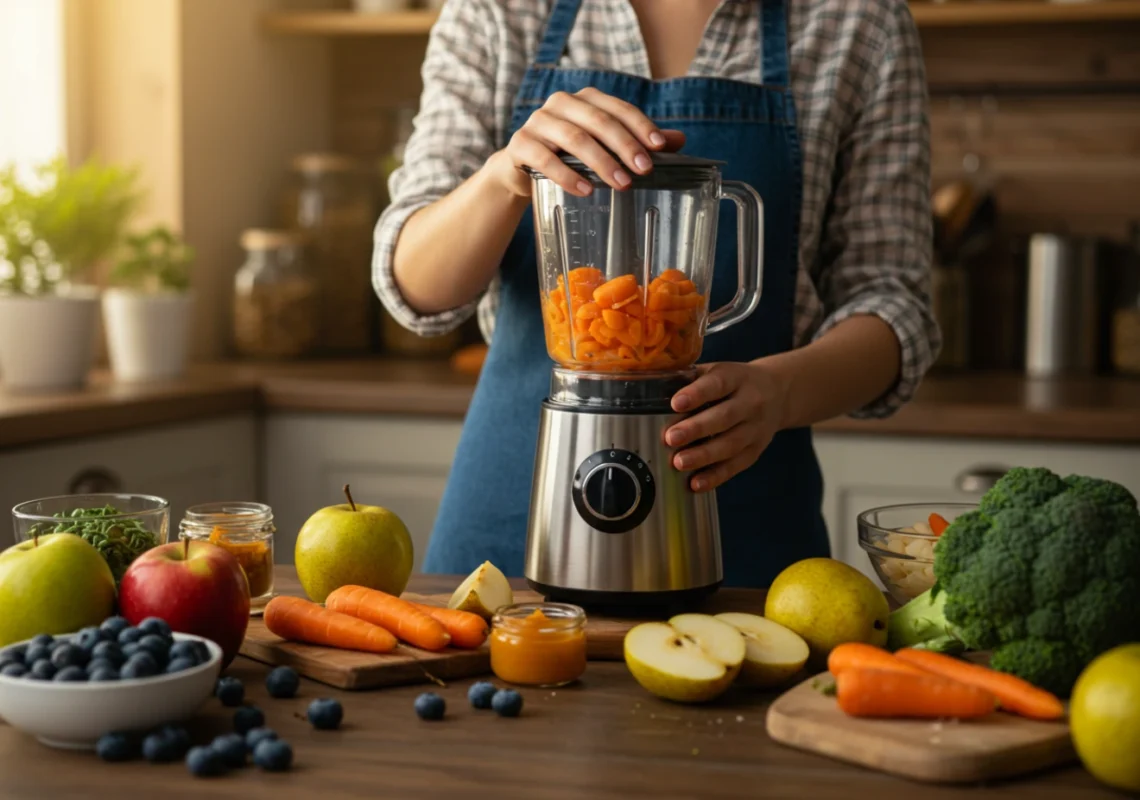In the kitchen, joyfully I ponder,
Is it really cheaper to make your own baby food, I wonder,
Nourishing my child with love, as flavors blend and thunder.
Introduction 🌟
When it comes to parenting, every decision feels significant, especially regarding your baby’s nutrition. One burning question many new parents grapple with is: Is it really cheaper to make your own baby food? As you juggle the myriad expenses that come with raising a child, this question becomes even more pressing. The financial implications alone can cause a considerable amount of stress. In this article, we’ll dissect the financial aspects of homemade baby food versus store-bought options, examine potential savings, explore the broader benefits of making your own baby food, and much more.
The Cost of Convenience: Store-Bought Baby Food vs. Homemade 🍼💰
Many parents find themselves reaching for store-bought baby food, enticed by the convenience it offers. However, one might wonder: Is making baby food cheaper than buying?
The Price Comparison 📊💵
To break it down, let’s consider some figures:
- Store-bought baby food: A single jar of plain organic baby food typically ranges from $1 to $2. When you calculate this cost over a month, feeding your baby twice per day might easily lead to a spending range of $60 to $120.
- Homemade baby food: By making your own food, you can use fresh produce that you may already buy for your family, thereby reducing waste. Buying ingredients like bananas, sweet potatoes, or avocados can cost significantly less. For instance, a 5-pound bag of sweet potatoes costs about $5, which can yield roughly 20 servings of homemade baby food. This places your cost at about $0.25 per serving!
How Much Money Do You Save By Making Your Own Baby Food? 💸🍲
The savings become even more apparent when we analyze the numbers. Suppose you prepare baby food at home for one month, focusing on fruits and vegetables that are in season. Instead of spending upwards of $100 for bought jars of baby food, you could potentially spend around $25 to $30 making your own.
Savings breakdown:
- Store-bought puree (for 60 servings): approximately $90-$120
- Homemade puree (for 60 servings): approximately $25-$30
- Total Savings: $60-$90 a month!
This adds up. By crafting your own baby food, you’re saving a considerable chunk of change compared to the convenience of store-bought jars. But the economic benefits don’t stop there!
What Is the Cheapest Way to Feed Your Baby? 👶🍽️
When assessing the cheapest way to feed your baby, one must also consider how to optimize meal prep. Here are a few tips to keep costs low while ensuring quality nutrition:
- Buy in Bulk: Purchasing fruits and vegetables in larger quantities often yields savings. Look for local farmers’ markets or wholesale stores where you can buy in bulk. Often, you can buy whole batches of fruits and veggies for a fraction of the cost.
- Seasonal Produce: Utilizing fruits and vegetables in season can substantially decrease costs. Not only are they cheaper, but they’re also at their peak flavor and nutrition! For example, zucchini is prolific in summer; buying a large quantity and making baby food from it can be cost-effective.
- Prep in Batches: Preparing baby food in bulk allows you to freeze portions for later. This approach minimizes prep time and reduces waste. For example, you can steam and purée carrots or peas and then freeze them in ice cube trays. Once they are frozen, transfer them to labeled freezer bags for easy access later.
- DIY Equipment: You don’t need special tools to make baby food! A simple blender or food processor, along with ice cube trays for freezing, will do the trick. Many parents find they can use everyday kitchen appliances to prepare nutritious food without any special investment.
- Plan Your Meals: Meal planning can help you narrow down what ingredients to buy. Knowing that you’ll be using certain fruits and vegetables can help you shop with purpose, avoiding impulse buys.
Is It Really Better to Make Your Own Baby Food? 🤔🍏
Beyond the financial aspects, many parents wonder: Is it really better to make your own baby food? This question touches on both health and personal preference.
Nutritional Benefits 🥕🥦
Making your own baby food allows you to control what goes into your baby’s diet. You can:
- Avoid Additives: Store-bought baby food may contain preservatives or additives that some parents prefer to avoid. When you make food at home, you choose fresh ingredients, ensuring no unnecessary chemicals or sugars.
- Customize Flavors: You can create unique flavor combinations that cater to your baby’s evolving palate. For instance, adding a pinch of cinnamon to applesauce or a squeeze of lemon to mashed peas can introduce your child to new flavors that store-bought options often miss.
- Ensure Freshness: Freshly made food retains more nutrients than processed counterparts. Additionally, the satisfaction of knowing exactly what’s in your child’s meals can’t be overstated. You have the opportunity to infuse your cooking with love!
Time Commitment vs. Family Involvement ⏳👨👩👧
One common concern new parents express is the time commitment required to make home-cooked baby food. Planning and preparing meals can feel overwhelming, particularly for those new to cooking.
However, here are a few points to consider:
- Involvement in Preparation: Making baby food can turn into a family activity. While it may be time-consuming initially, preparing meals as a joint effort can help families bond. Involving older children in the process can also teach them about healthy eating habits.
- Prepped Ahead: Once you’ve dedicated a few hours once a week to make baby food, you’ll have a stash ready to go for busy days. Preparation doesn’t have to be a daily task!
Emotional Connection ❤️🤱
The process of making baby food can also foster a deep emotional connection between you and your child. Each spoonful becomes a labor of love, and many parents find joy in discovering their baby’s taste preferences. Watching your little one react to flavors and textures can be incredibly fulfilling.
Real-Life Experiences: Parents’ Perspectives 👪🗣️
To further illustrate the impact of making baby food, let’s look at some real-life perspectives.
Sarah, a mother of two: “I started making baby food because I wanted to be more involved in my daughter’s nutrition. Not only did I find it cheaper, but I also enjoyed creating unique combinations. Watching her love the flavors I made was truly rewarding!”
Tom, a busy father: “I was skeptical at first, but making baby food became part of our weekly routine. It’s surprisingly quick, and we enjoy it as a family. Plus, the savings have allowed us to invest in organic produce for our family meals!”
Additional Benefits of Making Baby Food 🌱✨
While the financial angle is crucial, it’s also essential to consider the other advantages of homemade baby food:
- Less Environmental Impact: By making baby food at home, you’re lessening your reliance on packaged goods, which contributes to less waste. This choice aligns with a conscious effort to protect the environment, something that many parents value.
- More Variety: When making baby food, you can experiment with a wider range of ingredients compared to the limited options available on store shelves. This variety helps expose your child to different flavors and textures, which can be beneficial for their developing taste preferences.
- Convenience at Its Core: Although store-bought baby food offers convenience, preparing your meals can also lead to convenience in the long run. Having a stockpile of homemade baby food means no last-minute grocery store runs.
- Community Connections: Sharing recipes and ideas with other parents can create a sense of community. Engaging in discussions about baby food preparation leads to learning from others’ experiences and perhaps swapping homemade jars or ingredients.
FAQs❓🤓
As more parents explore this topic, common questions arise regarding homemade baby food. Let’s dive into some FAQs:
1. How long does homemade baby food last?
Homemade baby food can last up to 3 days in the refrigerator. If frozen in ice cube trays and then transferred to freezer bags, it can last for 3-6 months. Just be sure to label everything!
2. Do I need special equipment to make baby food?
No, you can use a regular blender, food processor, or even a fork to mash food according to your preference. The essentials you need are simple items found in your kitchen.
3. What foods are best for homemade baby food?
Fruits like bananas and avocados, vegetables such as sweet potatoes, carrots, and peas, and grains like oatmeal are excellent options. You can also experiment with combinations like apple-carrot or lentil-sweet potato.
4. When can I start making my own baby food?
Typically, you can start making baby food when your child is around 6 months old and ready for solid food. Always check with your pediatrician first to ensure safety.
5. Should I consult a pediatrician before making baby food?
Yes, it’s always best to consult your pediatrician before introducing new foods into your child’s diet to ensure safety and nutritional adequacy.
Conclusion 🎉
Making baby food at home is not only a cost-effective choice but also offers numerous health benefits and personal satisfaction. By controlling ingredients and customizing flavors, parents can provide their babies with nutritious meals without unnecessary additives. This approach fosters a deeper emotional bond during meal preparation and allows for the introduction of a wider variety of tastes and textures. Additionally, preparing food in batches can minimize waste and save time in the long run. Ultimately, whether to make your own baby food or buy store-bought options depends on individual preferences and values. Whichever path you choose, the care and love you invest in your child’s nutrition are what truly matter.

